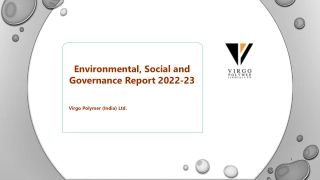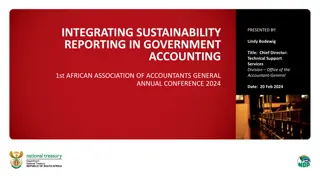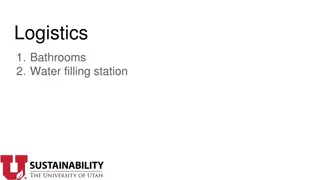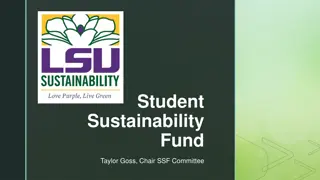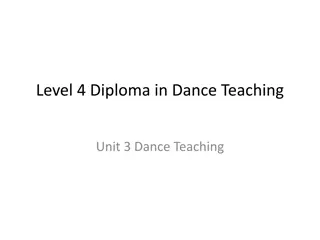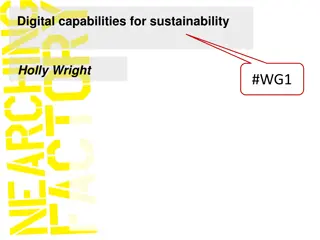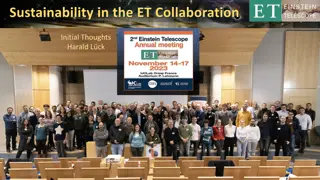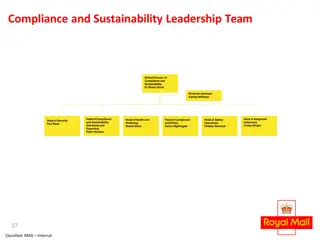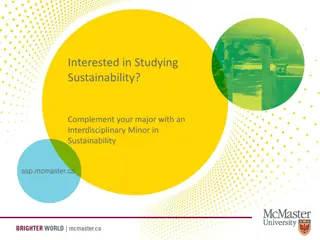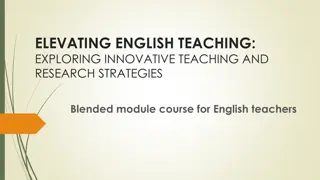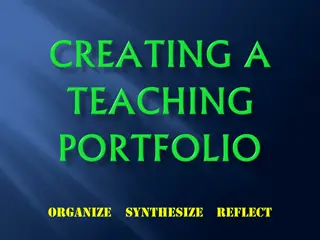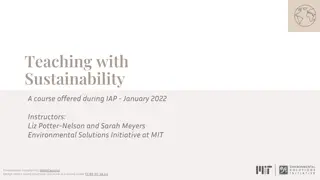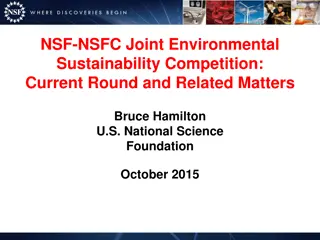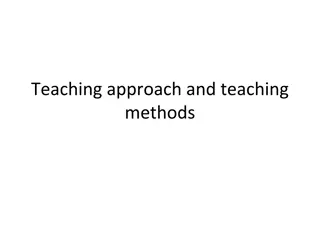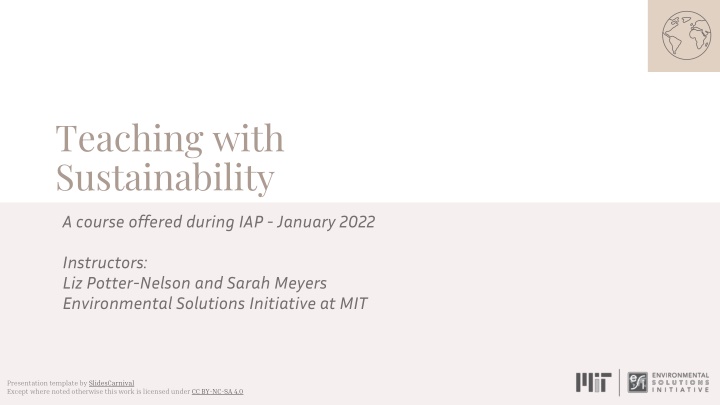
Teaching with Sustainability - January 2022 Course Overview
Delve into sustainability education with a focus on effective teaching methods, learning theories, and practical approaches. Explore topics such as defining sustainability, educational paradigms, and sustainable instructional strategies.
Download Presentation

Please find below an Image/Link to download the presentation.
The content on the website is provided AS IS for your information and personal use only. It may not be sold, licensed, or shared on other websites without obtaining consent from the author. If you encounter any issues during the download, it is possible that the publisher has removed the file from their server.
You are allowed to download the files provided on this website for personal or commercial use, subject to the condition that they are used lawfully. All files are the property of their respective owners.
The content on the website is provided AS IS for your information and personal use only. It may not be sold, licensed, or shared on other websites without obtaining consent from the author.
E N D
Presentation Transcript
Teaching with Sustainability A course offered during IAP - January 2022 Instructors: Liz Potter-Nelson and Sarah Meyers Environmental Solutions Initiative at MIT Presentation template by SlidesCarnival CC BY-NC-SA 4.0 SlidesCarnival Presentation template by SlidesCarnival Except where noted otherwise this work is licensed under CC BY-NC-SA 4.0 SlidesCarnival CC BY-NC-SA 4.0
Overview of Topics Week 1 - What is sustainability education? Week 2 Week 2 - - What is effective teaching? What is effective teaching? Defining sustainability using the Brundtland Report & sustainability education (link) Brief timeline of education to accomplish sustainability initiatives (link) Explanation of a Jigsaw Activity (link) Jigsaw activity of foundational sustainability documents (link) Effective teaching is complex Effective teaching is complex Learning theories provide a framework for how Learning theories provide a framework for how people learn people learn Theoretical perspectives used in sustainability Theoretical perspectives used in sustainability education education Sustainability Learning Approaches Sustainability Learning Approaches Positivism vs Postpositivism Positivism vs Postpositivism Positivism and Postpositivism Activity Positivism and Postpositivism Activity Practicality of Sustainability Education Practicality of Sustainability Education Week 3 - How do we teach sustainably? Week 4 - What does this look like for me? Asset vs Deficit Approaches (link) Criticism of US Education (link) Bloom s Taxonomy (link) Sustainability education looks to paradigm shifts (link) Levels of implementing sustainability (link) Level 1, Level 2, Level 3 (link) Transitioning through Sustainability Levels (link) Explanation of Categories of Sustainability Literacy Competencies (link) Explanation of Sustainable Instructional Approaches (link) Overview of Understand by Design (UbD) (link) Modified UbD template (link) Sticking Points (link) Presentation template by SlidesCarnival CC BY-NC-SA 4.0 SlidesCarnival 2
What is effective teaching? Week 2 Presentation template by SlidesCarnival CC BY-NC-SA 4.0 SlidesCarnival Back to Overview of Topics
Learning Objectives for Today Participants will be exposed to different education learning theories Participants will begin to identify what types of learning activities support sustainability education Presentation template by SlidesCarnival CC BY-NC-SA 4.0 SlidesCarnival 4
Opening Activity Take a moment and reflect on a happy classroom memory for you. Share this moment on the class different methods, include a Jamboard, padlet, a Google Doc or even generating comments on board. What do you think is the value in having an opening activity? Presentation template by SlidesCarnival CC BY-NC-SA 4.0 SlidesCarnival 5
Effective Teaching Many practitioners view education as a pendulum; stick around long enough and you ll be back to what you were doing when you started. One of these continuums is content knowledge vs skill knowledge Current trend in education is to stress the building of skills over content knowledge Yes, students do need content. Do they need it all? Presentation template by SlidesCarnival CC BY-NC-SA 4.0 SlidesCarnival 6
Effective Teaching Similar to sustainability, effective teaching is complex & nuanced. Presentation template by SlidesCarnival CC BY-NC-SA 4.0 SlidesCarnival 7
Effective Teaching Instructors, at any grade/age level need to consider: Standards Curriculum Behavior Learning Goals for Students Institutional Expectations Stakeholders In addition instructors also need to consider: Students prior knowledge How students think How students process new information How students are motivated Presentation template by SlidesCarnival CC BY-NC-SA 4.0 SlidesCarnival 8
Effective Teaching - Learning theories address the complex nature of how people learn. Learning Theories The following are often cited in education literature: Constructivist Learning Theory (Piaget) Social Learning Theory (Vygotsky) Transformative Learning Theory (Mezirow) Behavioral Learning Theory (Skinner and Pavlov) Presentation template by SlidesCarnival CC BY-NC-SA 4.0 SlidesCarnival 9
Learning Theories Constructivist Learning Theory Social Learning Theory Transformative Learning Theory Learners construct their learning based on their own personal understandings experiences Learners engage with new understandings of concepts through interactions with society Learners critically reflect and change viewpoints based on a disorienting dilemma Role of instructor is to guide and assist students in equilibrating new information with old ideas Role of instructor is to provide students with opportunities to socially interact with new information Role of of instructor is to serve as a facilitator in providing experiences where students can be conscious of their assumptions, beliefs and perspectives through exposure to new view points Presentation template by SlidesCarnival CC BY-NC-SA 4.0 SlidesCarnival Scaffolding Many of these learning theories require the instructor to scaffold students from concrete concepts to abstract understandings 10
Learning Theories Behavioral Learning Theory is often viewed as a more passive way for students to acquire knowledge In behavioral learning theory students behaviors can be shaped based on the stimulus they receive There is a place for behavioral learning theory in the classroom and is often used in the setting of routines and expectations for students Presentation template by SlidesCarnival CC BY-NC-SA 4.0 SlidesCarnival 11
Sustainability Education Founded in pragmatism and behaviorism. Instrumental Responds to the urgency for change. Knowledge will lead to behavioral changes. Founded in idealism and social constructivism Looks toward the process for the learner Learner is encouraged to be a systemic, critical thinker Intrinsic Critical Presentation template by SlidesCarnival CC BY-NC-SA 4.0 SlidesCarnival Counters the view that education is innocuous Fosters an education system that brings awareness to and overcomes patterns of dominance and injustice. 12 (Nolet, 2016)
Reflection In the chat, please take a moment or two and share, generally speaking, how you were taught when you were a student. Not the awesome field trip or the cool chemistry lab you were in but how 80% or more of your time in class was spent. Presentation template by SlidesCarnival CC BY-NC-SA 4.0 SlidesCarnival 13
Sustainability Education Sustainability education looks at ways to transform systems of thinking and learning. Juxtaposed with that idea is that most people teach the way that they were taught. Presentation template by SlidesCarnival CC BY-NC-SA 4.0 SlidesCarnival 14
Brainstorm Let s generate a list of different types of classroom activities that students could participate in throughout a course. 1. Take a few minutes and brainstorm some ideas, stretch, move around 2. Share your ideas with a small group through Jamboard 3. Preview each other s ideas Presentation template by SlidesCarnival CC BY-NC-SA 4.0 SlidesCarnival 15
Sustainability Education Sustainability education looks at ways to transform systems of thinking and learning. Juxtaposed with that idea is that most people teach the way that they were taught. Education of a different kind Presentation template by SlidesCarnival CC BY-NC-SA 4.0 SlidesCarnival 16
Sustainability Education Teaching for Sustainability encourages the following types of learning: Active Participatory Experiential Engaging head, heart, and hands Interdisciplinary approaches Holistic and critical thinking Place-based Learning Presentation template by SlidesCarnival CC BY-NC-SA 4.0 SlidesCarnival 17
Sustainability Education Thinking of education like this, in many cases, is a shift from what we know, what we ve experience, and what is expected from our students, and our colleagues. Let s dive a little deeper into the differences between Positivism & Postpositivsm Presentation template by SlidesCarnival CC BY-NC-SA 4.0 SlidesCarnival Christie, B. A., Miller, K. K., Cooke, R., & White, J. G. (2013). Environmental sustainability in higher education: how do academics teach? Environmental Education Research, 19(3), 385 414. https://doi.org/10.1080/13504622.2012.698598 18
Sustainability Education - Positivist Approaches to Education: Postpositivist Approaches to Education: Assumptions Objective, value free, truth, which can be measured, defined and taught to students (Littledyke and Manolas 2010) Subjective, value laden, tentative knowledge which is recognised as subject to change due to context, constructivist knowledge (Littledyke and Manolas 2010) Presentation template by SlidesCarnival CC BY-NC-SA 4.0 SlidesCarnival 19
Sustainability Education - Positivist Approaches to Education: Postpositivist Approaches to Education: Ideological Influences - Instrumental ideology encourages learning for economic gain - Reconstructive ideology emphasizes social change with a focus on the future Presentation template by SlidesCarnival CC BY-NC-SA 4.0 SlidesCarnival 20
Sustainability Education - Positivist Approaches to Education: Postpositivist Approaches to Education: Associated Pedagogies - - - Knowledge-centered Discipline specific Prescribed by curriculum and assessment requirements - - - Student-centered Multidisciplinary Connected to real world application, focused on shared learning experiences and active learning Presentation template by SlidesCarnival CC BY-NC-SA 4.0 SlidesCarnival 21
Sustainability Education - Positivist Approaches to Education: Postpositivist Approaches to Education: Roles of teacher and student - Teachers are directors and vessels of knowledge who transmit knowledge to students - Teachers are facilitators who support students investigations Presentation template by SlidesCarnival CC BY-NC-SA 4.0 SlidesCarnival 22
Sustainability Education - Positivist Approaches to Education: Postpositivist Approaches to Education: Types of Activities Let s revisit the list of activities that we compiled earlier Presentation template by SlidesCarnival CC BY-NC-SA 4.0 SlidesCarnival 23
What Type of Activities? 1. Find your group s Google Slides (Link) a. Move things around by clicking and dragging b. You can reference this list of activities (Link) 2. Determine which activities are more positivistic in nature, which are more postpositivistic in nature and which activities you re not sure about 3. If time permits Answer the questions for the group Presentation template by SlidesCarnival CC BY-NC-SA 4.0 SlidesCarnival 24
Practicality Teaching is all about choices. As much as we want to do everything perfectly all the time, we can t Weigh different factors and make the best decision possible with the various pieces of information If change isn t possible this time, take a small step and promise yourself you ll address it next time. Presentation template by SlidesCarnival CC BY-NC-SA 4.0 SlidesCarnival 25
Sticking Points You re changing the norm for: Students Students are familiar with the status quo and they become more familiar the older they get. If you shake it up on them there is some inherent push back because they know the system and you re changing the system. Colleagues Colleagues may bristle at you teaching differently than you have in the past. You Not everything you try will be a success the first time. That doesn t mean you should give up! Presentation template by SlidesCarnival CC BY-NC-SA 4.0 SlidesCarnival 26
Pause for Pedagogy Discussion 1: Let s dissect the brainstorming activity Discussion 1: Let s dissect the brainstorming activity 1. 2. 2. 1. What was unique about this brainstorming activity? What are ways that you can respond to students to be more inclusive during a brainstorming session? inclusive during a brainstorming session? What was unique about this brainstorming activity? What are ways that you can respond to students to be more Discussion 2: A lot of class was a lecture 1. Why do you think I made the decision to provide information to you in a lecture format? How did I engage you throughout the lecture? What are some ways you could have learned this material that wasn t a lecture? 2. 3. Presentation template by SlidesCarnival CC BY-NC-SA 4.0 SlidesCarnival 27
Going Further Articles that address topics from class today: Christie, B. A., Miller, K. K., Cooke, R., & White, J. G. (2013). Environmental sustainability in higher education: how do academics teach? Environmental Education Research,19(3), 385 414. https://doi.org/10.1080/13504622.2012.698598 Armstrong, C. M. (2011). Implementing education for sustainable development: The potential use of time-honored pedagogical practice for the progressive era of education. Journal of Sustainability Education, 2. Evans, N., Ferreira, J. (2020). What does the research evidence base tell us about the use and impact of sustainability pedagogies in initial teacher education? Environmental Education Research, 26(1), 27-42. https://doi.org/10.1080/13504622.2019.1703908 Presentation template by SlidesCarnival CC BY-NC-SA 4.0 SlidesCarnival 28
Preview of Next Week Next week we ll dive more deeply into Education about sustainability, for sustainability and education as sustainability We ll also work to identify our goals for students and how to tie our goals to our instruction Presentation template by SlidesCarnival CC BY-NC-SA 4.0 SlidesCarnival 29
Review of Learning Objectives Participants will be exposed to different education learning theories Participants will begin to identify what types of learning activities support sustainability education 1. What did you learn today? 2. How will people you interact with know and benefit? Presentation template by SlidesCarnival CC BY-NC-SA 4.0 SlidesCarnival 30
MIT OpenCourseWare https://ocw.mit.edu RES.ENV-006 Teaching with Sustainability IAP 2022 For more information about citing these materials or our Terms of Use, visit https://ocw.mit.edu/terms. Presentation template by SlidesCarnival CC BY-NC-SA 4.0 SlidesCarnival 31

